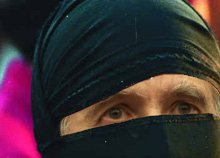 Leader of the House Jack Straw has waded into Britain’s debate about multi-culturalism over the last couple of days, stating that he asks Muslim women wearing a veil to remove it when he meets them at surgeries in his Blackburn constituency. Straw’s words – both in written form yesterday, and this morning on the Today programme on Radio 4, were chosen with considerable care:
Leader of the House Jack Straw has waded into Britain’s debate about multi-culturalism over the last couple of days, stating that he asks Muslim women wearing a veil to remove it when he meets them at surgeries in his Blackburn constituency. Straw’s words – both in written form yesterday, and this morning on the Today programme on Radio 4, were chosen with considerable care:
We are able to relate to people we don’t know by reading their faces and if you can’t see their faces, that provides some separation
I think this is a perfectly justifiable position to take. To partly illustrate the point, have a look at the image here – can you in any way read Straw’s facial expression? Further, Straw has been very careful to state that this is in no way a criticism of the hijab – the headscarf – but is a matter of whether the face should be covered.
Reaction of Muslim groups has been mixed – see this summary from The Guardian. The comment by Mussoud Shadjareh strikes me as most ludicrous:
Would he say to the Jewish people living in Stamford Hill [in London] that they shouldn’t dress like Orthodox Jews?
No, their dress does not involve the complete covering of the face, and that’s what Jack Straw’s point was. The measured words of the Leader of the House were carefully thought out, and compassionately spoken. His reason deserves to be met with a reasoned answer, and I welcome his efforts to deal with this issue.








I also agree. But mainly I think the media coverage has been absolutely scandalous, blowing Jack Straw’s remarks out of all proportion and completely ignoring the measured, considered tone in which they were written. Moreover, all he’s been doing is politely requesting women uncover their faces, not making it a precondition of a meeting or calling into question their freedom to dress in this way. Incidentally, I have heard similar views to Straw’s expressed by academic colleagues who have no trouble teaching women wearing the hijab but find it very difficult when they can’t see their students’ faces.
So do I. I think this is an important question which we should address in a truly multi-cultural society. That is, one which questions all assumed positions, including all assumptions about dress in all all communities.